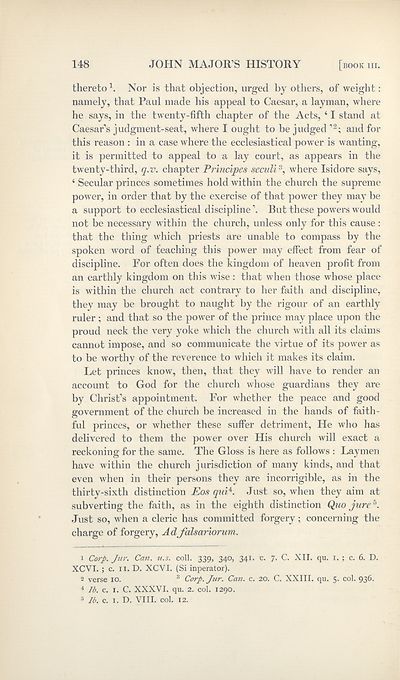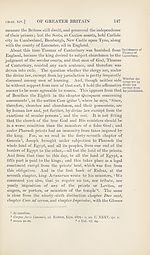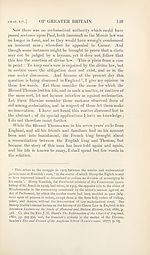Series 1 > History of Greater Britain, as well England as Scotland
(293) Page 148
Download files
Complete book:
Individual page:
Thumbnail gallery: Grid view | List view

148
JOHN MAJOR’S HISTORY
[book III.
thereto1. Nor is that objection, urged by others, of weight:
namely, that Paul made his appeal to Caesar, a layman, where
he says, in the twenty-fifth chapter of the Acts, ‘ I stand at
Caesar’s judgment-seat, where I ought to be judged ’2; and for
this reason : in a case where the ecclesiastical power is wanting,
it is permitted to appeal to a lay court, as appears in the
twenty-third, q.v. chapter Prindpes sectili where Isidore says,
4 Secular princes sometimes hold within the church the supreme
power, in order that by the exercise of that power they may be
a support to ecclesiastical discipline ’. But these powers would
not be necessary within the church, unless only for this cause :
that the thing which priests are unable to compass by the
spoken word of teaching this power may effect from fear of
discipline. For often does the kingdom of heaven profit from
an earthly kingdom on this wise: that when those whose place
is within the church act contrary to her faith and discipline,
they may be brought to naught by the rigour of an earthly
ruler; and that so the power of the prince may place upon the
proud neck the very yoke which the church with all its claims
cannot impose, and so communicate the virtue of its power as
to be worthy of the reverence to which it makes its claim.
Let princes know, then, that they will have to render an
account to God for the church whose guardians they are
by Christ’s appointment. For whether the peace and good
government of the church be increased in the hands of faith¬
ful princes, or whether these suffer detriment, He who has
delivered to them the power over His church will exact a
reckoning for the same. The Gloss is here as follows : Laymen
have within the church jurisdiction of many kinds, and that
even when in their persons they are incorrigible, as in the
thirty-sixth distinction Eos qui*. Just so, when they aim at
subverting the faith, as in the eighth distinction Quo jure5.
Just so, when a cleric has committed forgery; concerning the
charge of forgery, A d falsariorum.
1 Corp. Jur. Can. u.s. coll. 339, 340, 341. c. 7. C. XII. qu. 1. ; c. 6. D.
XCVI. ; c. 11. D. XCVI. (Si inperator).
2 verse 10. s Corp. Jur. Can. c. 20. C. XXIII. qn. 5. col. 936.
4 lb. c. 1. C. XXXVI. qu. 2. col. 1290.
5 lb. c. 1. D. VIII. col. 12.
JOHN MAJOR’S HISTORY
[book III.
thereto1. Nor is that objection, urged by others, of weight:
namely, that Paul made his appeal to Caesar, a layman, where
he says, in the twenty-fifth chapter of the Acts, ‘ I stand at
Caesar’s judgment-seat, where I ought to be judged ’2; and for
this reason : in a case where the ecclesiastical power is wanting,
it is permitted to appeal to a lay court, as appears in the
twenty-third, q.v. chapter Prindpes sectili where Isidore says,
4 Secular princes sometimes hold within the church the supreme
power, in order that by the exercise of that power they may be
a support to ecclesiastical discipline ’. But these powers would
not be necessary within the church, unless only for this cause :
that the thing which priests are unable to compass by the
spoken word of teaching this power may effect from fear of
discipline. For often does the kingdom of heaven profit from
an earthly kingdom on this wise: that when those whose place
is within the church act contrary to her faith and discipline,
they may be brought to naught by the rigour of an earthly
ruler; and that so the power of the prince may place upon the
proud neck the very yoke which the church with all its claims
cannot impose, and so communicate the virtue of its power as
to be worthy of the reverence to which it makes its claim.
Let princes know, then, that they will have to render an
account to God for the church whose guardians they are
by Christ’s appointment. For whether the peace and good
government of the church be increased in the hands of faith¬
ful princes, or whether these suffer detriment, He who has
delivered to them the power over His church will exact a
reckoning for the same. The Gloss is here as follows : Laymen
have within the church jurisdiction of many kinds, and that
even when in their persons they are incorrigible, as in the
thirty-sixth distinction Eos qui*. Just so, when they aim at
subverting the faith, as in the eighth distinction Quo jure5.
Just so, when a cleric has committed forgery; concerning the
charge of forgery, A d falsariorum.
1 Corp. Jur. Can. u.s. coll. 339, 340, 341. c. 7. C. XII. qu. 1. ; c. 6. D.
XCVI. ; c. 11. D. XCVI. (Si inperator).
2 verse 10. s Corp. Jur. Can. c. 20. C. XXIII. qn. 5. col. 936.
4 lb. c. 1. C. XXXVI. qu. 2. col. 1290.
5 lb. c. 1. D. VIII. col. 12.
Set display mode to:
![]() Universal Viewer |
Universal Viewer | ![]() Mirador |
Large image | Transcription
Mirador |
Large image | Transcription
Images and transcriptions on this page, including medium image downloads, may be used under the Creative Commons Attribution 4.0 International Licence unless otherwise stated. ![]()
| Scottish History Society volumes > Series 1 > History of Greater Britain, as well England as Scotland > (293) Page 148 |
|---|
| Permanent URL | https://digital.nls.uk/127735281 |
|---|
| Attribution and copyright: |
|
|---|
| Description | Over 180 volumes, published by the Scottish History Society, containing original sources on Scotland's history and people. With a wide range of subjects, the books collectively cover all periods from the 12th to 20th centuries, and reflect changing trends in Scottish history. Sources are accompanied by scholarly interpretation, references and bibliographies. Volumes are usually published annually, and more digitised volumes will be added as they become available. |
|---|


